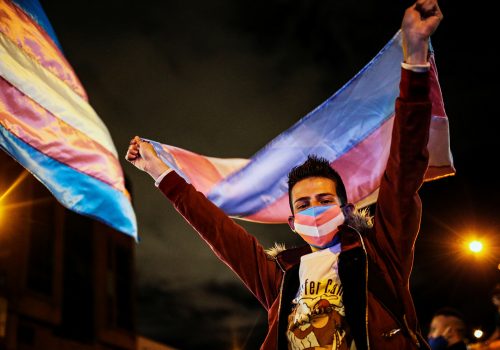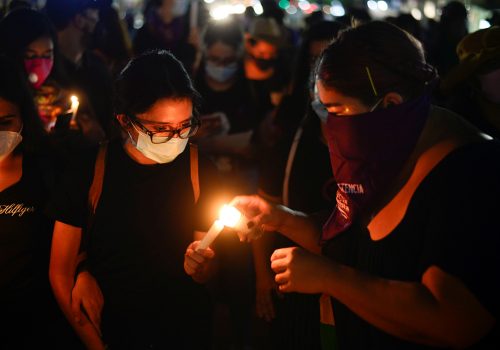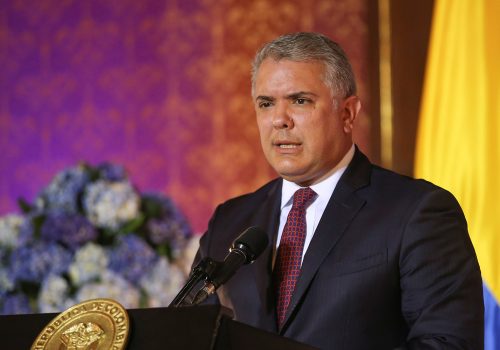
María Gonzalez, a sixty-one-year-old Honduran woman, has been her family’s breadwinner since 1995. But when Honduras reported its first case of COVID-19 on March 11, 2020, Gonzalez’s employers informed her that she would be furloughed indefinitely. As a domestic worker in the city of San Pedro Sula, Gonzalez earned minimum wage—thirty-eight lempiras (less than two dollars) per hour—and had limited social-security benefits. She was left with no income and seven mouths to feed in her household. Gonzalez’s story, which she told me, captures the hardship that millions of women are facing due to the global pandemic.
The economic crisis triggered by the pandemic has had unequal consequences across the labor market in Latin America and the Caribbean, with women disproportionately affected both in the formal and informal sectors. Survey data from the World Bank shows that female workers were 44 percent more likely than their male counterparts to lose their jobs at the start of the pandemic. And while temporarily unemployed workers have begun returning to the labor market, job losses are persisting at a higher rate among women.
According to global impact assessments from the Economic Commission for Latin America and the Caribbean (ECLAC), 56.9 percent of women in Latin America and 54.3 percent in the Caribbean are employed in sectors hit hardest by the pandemic including tourism, manufacturing, wholesale and retail trade, paid domestic work, healthcare, and education. In the region’s tourism sector alone—which suffered a significant contraction, particularly in the Caribbean—women represent almost 62 percent of employment. And like Gonzalez, between eleven and eighteen million people in the region are engaged in paid domestic work, of which 93 percent are women.
The pandemic is also making it more difficult to achieve gender equality in the future. In August 2020, ECLAC estimated that the poverty rate among women would increase to 37.4 percent over the course of the year (a year-on-year increase of 22 percent), with 118 million women in the region expected to fall into poverty. Women who are out of the workforce and forced to stay at home not only face an increased workload in the household but also a higher risk of domestic violence. Indigenous, rural, and Afro-descendant women in particular have felt the impacts of a lack of access to information, healthcare, and productive resources since the start of the pandemic, on top of the already stark inequalities they faced before the crisis.
As Latin America and the Caribbean face an estimated -7.4 percent economic contraction in 2020 and another lost decade, the pandemic thus threatens to deepen existing gender gaps in the region. But the multidimensional crisis also presents an opportunity for the region to reshape women’s roles in the economy, politics, and society.
Seizing that opportunity will require governments to develop policy responses that target women and help ensure an inclusive recovery, including the following steps:
- Investing in girls’ education: COVID-19 recovery plans must prioritize investing in girls’ education to help economies build back stronger. A Citi Global Perspectives & Solutions report found that developing countries could achieve a 10 percent boost in their gross domestic product over the next decade if they manage to ensure by 2030 that all girls finish their secondary education. The report, which was based on a study of eight developing nations, including Bolivia, calls for a holistic approach to investments and interventions for addressing not just education but also the cross-cutting issues of health, economic independence, and gender-based violence over the course of a girl’s life. In addition to helping increase girls’ graduation rates, the United States can also partner with the region to improve the quality of girls’ education by accelerating the development of and opening access to technological tools in schools, as hard skills like coding become increasingly necessary in the workforce.
- Reforming the care economy: Latin American and Caribbean governments must create recovery plans that implement reforms in the care economy to help support women as they re-enter the workforce. By introducing safety-net programs that target female-headed households, informal and domestic workers who lack social-protection coverage, and unemployed women, governments in the region can help mitigate the negative effects of the pandemic. Governments must be intentional about bringing women back not only into the workforce, but specifically into the formal economy. Policies such as providing incentives for formalization, creating business-plan competitions, and improving access to finance may help increase the number of women in the formal economy. Moreover, expanding coverage of social-protection programs and social security for workers is critical to guarantee the rights and wellbeing of indigenous, rural, and Afro-descendant women.
- Including women in decision-making: Above all else, women should be present in the decision-making processes for COVID-19 recovery plans. In the past year, the countries that have had the best COVID-19 responses have been those led by women.
As a group that has been severely and disproportionately impacted by the pandemic, women are key stakeholders in responding to and managing the recovery from the COVID-19 crisis. Governments have a responsibility to integrate the insights of women’s-rights organizations and women-led organizations into their decision-making not only to strengthen women’s leadership, but also to harmonize their efforts to counter the pandemic across numerous sectors in order to effectively reach all women.
By focusing on those who have borne the brunt of this pandemic and seeking to understand their perspectives, we can help ensure that policies designed in the present do not make women’s living conditions more precarious in the future.
Eva Lardizábal is an Atlantic Council Young Global Professional with the Adrienne Arsht Latin America Center.
Further reading
Image: The importance of formalizing private houseworkers so that they have access to health, social protection and agreements to agree on wages and breaks are the main measures suggested by UN Women to guarantee rights to this sector, which she also highlighted some Argentine policies, especially in a pandemic, that proved "to be fundamental." Eva Cabrera / Latin America News Agency via Reuters Connect



